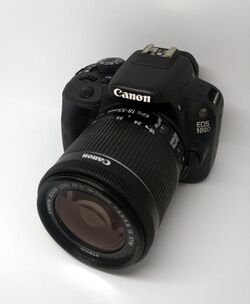Engineering:Canon EOS 100D
 | |
| Overview | |
|---|---|
| Type | Digital single-lens reflex camera |
| Lens | |
| Lens | Interchangeable (EF / EF-S) |
| Sensor/medium | |
| Sensor type | CMOS |
| Sensor size | 22.3 × 14.9 mm (APS-C format) |
| Maximum resolution | 5184 × 3456 (18.0 effective megapixels) |
| Film speed | 100 – 12800 (expandable to H: 25600) |
| Storage media | SD/SDHC/SDXC card (UHS-I bus supported) |
| Focusing | |
| Focus modes | Evaluative, Partial, Spot, Centre-weighted Average |
| Focus areas | 9 AF points, 1 cross type (center) |
| Exposure/metering | |
| Exposure modes | Scene Intelligent Auto, Flash Off, Creative Auto, Portrait, Landscape, Close-up, Sports, Special Scenes (Night Portrait, Handheld Night Scene, HDR Backlight Control, Kids, Foods, Candlelight), Program AE, Shutter priority AE, Aperture priority AE, Manual Exposure, Movie |
| Exposure metering | Full aperture TTL, 63 zones iFCL SPC |
| Metering modes | Evaluative, Partial, Spot, Centre-weighted Average |
| Flash | |
| Flash | E-TTL II auto-pop-up built-in / External |
| Flash bracketing | Yes, with external flash |
| Shutter | |
| Shutter | Electronic focal-plane |
| Shutter speed range | 1/4000 sec. – 30 sec. and Bulb; X-sync at 1/200 sec. |
| Continuous shooting | 4.0 fps for 28 JPEG frames or for 7 RAW frames |
| Viewfinder | |
| Viewfinder | Eye-level pentamirror with 95% coverage and 0.87x magnification / LCD (Live View) |
| Image processing | |
| Image processor | DIGIC 5 |
| White balance | Auto, Daylight, Shade, Cloudy, Tungsten, White Fluorescent, Flash, Custom |
| General | |
| LCD screen | 3.0" (7.7 cm) Clear View II colour TFT touchscreen LCD with 1,040,000 dots |
| Battery | Lithium-Ion LP-E12 rechargeable |
| Dimensions | 116.8 mm × 90.7 mm × 69.4 mm (4.60 in × 3.57 in × 2.73 in) (W x H x D) |
| Weight | 407 g (14.4 oz) (CIPA standard) |
| Made in | Taiwan / Japan |
| Chronology | |
| Successor | Canon EOS 200D |
The Canon EOS 100D, known as the EOS Rebel SL1 in the Americas and EOS Kiss X7 in Japan, is an 18.0-megapixel digital single-lens reflex camera announced by Canon on 21 March 2013.[1] It has been described as the "world's smallest and lightest DSLR camera", either currently in production[2] or in the APS-C format.[3] Canon uses a smaller version of the APS-C sensor format than some other manufacturers including Nikon, Pentax, and Sony, with a crop factor of 1.6 rather than 1.5. It weighs 407 grams including battery and memory card.[4]
The successor of the EOS 100D is the EOS 200D.
Features
The EOS 100D shares a similar set of features with the larger Canon EOS 700D. However, it does have an improved focus tracking system in live view mode called Hybrid CMOS AF II with 80% frame coverage. The 700D has the previous version of Hybrid CMOS AF with much reduced frame coverage.[5]
Features include:
- 18.0 effective megapixel APS-C CMOS sensor
- DIGIC 5 image processor with 14-bit processing
- 95% viewfinder frame coverage with 0.87x magnification
- 1080p HD video recording at 24p, 25p (25 Hz) and 30p (29.97 Hz) with drop frame timing
- 720p HD video recording at 50p (50 Hz) and 60p (59.94 Hz)
- 480p ED video recording at 30p and 25p
- 4.0 frames per second continuous shooting
- 3" Clear View II LCD touchscreen with 1.04-megapixel resolution. The 100D has a fixed screen (unlike the articulated screen of the 700D and that camera's immediate predecessors, the 650D and 600D).
- 3.5 mm microphone jack for external microphones or recorders
- 9-point autofocus sensors with 1 cross type sensor in center
- The 100D model is also available in white body color.[6] To go together with it the two lenses were produced also in white color: EF-S 18-55mm STM and EF 40mm.
References
- ↑ "Canon EOS 100D launched as 18MP DSLR – News". Trusted Reviews. http://www.trustedreviews.com/news/canon-eos-100d-launched-as-18mp-dslr.
- ↑ "Guide to DSLRs launched in 2013". Amateur Photographer. 29 January 2014. http://www.amateurphotographer.co.uk/round-ups/camera_round_ups/guide-to-dslrs-launched-in-2013-7560.
- ↑ "Canon EOS Rebel SL1 / 100D Press Release". Canon Inc., reproduced by The-digital-picture.com. http://www.the-digital-picture.com/Press-Release/Canon-EOS-Rebel-SL1.aspx. "Among digital SLR cameras which use APS-C size equivalent sensors"
- ↑ "Canon EOS 100D – EOS Digital SLR and Compact System Cameras – Canon UK". Canon.co.uk. http://www.canon.co.uk/For_Home/Product_Finder/Cameras/Digital_SLR/EOS_100D/index.aspx.
- ↑ "Canon EOS 100D/Rebel SL1 Review: Digital Photography Review". dpreview.com. 1 July 2013. http://www.dpreview.com/reviews/canon-eos-100d-rebel-sl1/6.
- ↑ "Canon EOS Kiss X7 / 100D / Rebel SL1 (White) announced". http://www.cameraegg.org/canon-eos-kiss-x7-white-announced/.
External links
 |
